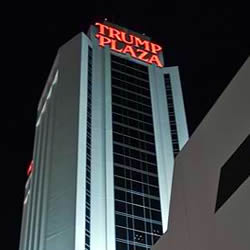Atlantic City’s casinos saw their gross operating profits drop from $360 million in 2012 to $235 million in 2013. Even with a late-year boost from the Internet gambling players, the city’s casinos were not able to turn around the industry. Some cause for optimism remains, though.
The numbers at the end of the year, when online gambling began, were an improvement over the previous year. The fourth quarter of the year saw the first returns on the iGaming portals, and those months saw marked improvement over the previous year’s numbers
In fourth quarter of 2012, the Atlantic City casinos showed gross operating losses reduced by more than 73%, with a total $21.6 million in losses. In fourth quarter 2013, the gross operating losses were at $5.7 million, which is a great deal better than the year prior. Of course, 2012 is when the year was hit by Superstorm Sandy, so the drop-off from that tragedy makes the numbers quite hard to compare.
What Are Gross Operating Profits?
Gross operating profits are an operation’s earnings before taxes, depreciation, interest, and other expenses are deducted. The measure is widely seen in the industry as a local casino industry’s profitability. Casinos which report gross operating losses instead of profits will follow the same formula, though the actual net losses will be far worse, due to expenses, taxes, interest, and depreciation. While a few of the Boardwalk casinos continue to show solid profits, the numbers are down across the board. This is a trend which has been building for 8 fiscal years now.
Declining Numbers since 2006
In 2006, Pennsylvania opened up its gaming industry to land-based casino operations. Ever since that time, Atlantic City gaming houses have seen their profits and revenues decline. Not only do gamblers in Pennsylvania often stay home instead of gambling in Atlantic City, but those casinos also attract players from other nearby states: New York, West Virginia, Ohio, Michigan, and Kentucky.
Pennsylvanian’s entry into the casino gambling market has seen the northeastern market become saturated. New Jersey has lost billions in revenues, while the population has seen thousands of jobs lost.
Tropicana and Borgata Prosper
The Atlantic City casinos which launched successful gaming sites came out far better than those websites which could not hit the ground running. Tropicana saw a 47% increase in earnings, up to $26.5 million. Borgata, the #1 online gaming operation since the New Jersey launch, saw a 2% increase up to over $121 million. That might seem like a small increase, but when Borgata has such a large advantage over the competition, it is significant.
Trump Taj Mahal and Trump Plaza
Trump Taj Mahal had a healthy revenue of $19.6 million, but those numbers represented a 55% loss in revenues. Trump Plaza may have been worst hit, as it saw a $10 million profit switch to a $4.7 million in losses.
The Golden Nugget saw a marginal news, as it’s $11 million-plus losses in 2012 were replaced with $10 million-plus in losses in 2013. Harrah’s Resort saw a 19.6% decline with $102.1 million in profits. Showboat Casino had its revenues drop by 28%, as it had revenues in excess of $34 million.
Bally’s Casino saw a decline of 54%, as its operating losses went to $33.4 million. Caesars Atlantic City had its profits fall by 16%, though it recorded profits of $69.5 million. Caesars Interactive Entertainment saw an operating loss of $1.3 million, though these are startup costs.
Casinos in Trouble
Revel Casino Hotel had its operating loss increase by 17.4%, all the way up to $130.2 million. Revel Casino continues to seek a buyer. When one sees these numbers, it’s no wonder that the Revel Casino is looking for an influx of cash.
The operating losses for Atlantic Club were at $12.7 million, which was down some 34%. The company saw some profit, but the amount was too late to avoid bankruptcy. The Atlantic Club was purchased by Caesars Entertainment and Tropicana Entertainment, which divided the company’s assets.
Reasons for Hope
New Jersey Casino Control Commission Chairman Matt Levinson saw good signs, though. He pointed out that the sales tax, tourism tax, hotel tax, and luxury tax revenues were the highest they had ever been. While the gaming revenues continue to sputter, Atlantic City’s casinos continue to broaden their non-gaming revenue base. If the city’s gaming operations can find ways to get healthy again, perhaps through a combination of land-based sports betting and online gambling, then the trends might one day turn around.

